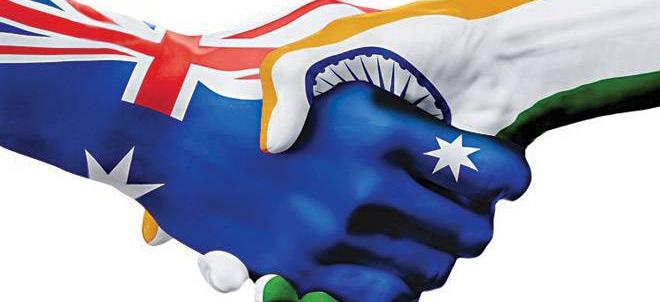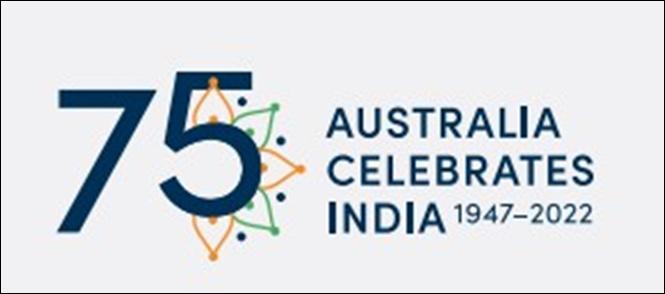
19 minute read
Policy Dialogues
Azadi ka Amrit Mahotsav on “Role of Constitutional Democracies in Shaping the Emerging World Order” commemorating India’s 75th year of independence
A report by Ms Anushka Saxena, Adjunct Fellow, IAIE On 26th November 2021, the Institute of Australia-India Engagement (IAIE), organized a hybrid international webinar on the “Role of Constitutional Democracies in Shaping the Emerging World Order” in partnership with the Indian High Commission - Canberra, Australian Department of Foreign Affairs and Trade (DFAT), Centre for India-Australia Studies (CIAS) - O.P Jindal Global University and India News Australia. The event commemorated India’s Constitution Day as part of Azadi ka Amrit Mahotsav celebrating 75 years of India’s independence. The webinar featured keynote speakers Mr Suneet Mehra (Deputy High Commissioner of India to Australia) and Mr Ian Biggs (Deputy High Commissioner of Australia to India), and distinguished speakers - Mrs Archana Singh (Honorary Consul of India in Queensland), Mr Michael Feller (Director, India Political Section, North and South Asia Division, DFAT), Prof. Yogesh Joshi (Research Fellow, Institute for South Asian Studies, National University of Singapore) and Ms. Lalitha Kumaramangalam (Director, India Foundation) and Prof. Shaun Star (Director, CIAS). The event was chaired and moderated by Dr Ashutosh Misra (CEO, IAIE). Delivering the introductory remark Ashutosh Misra said that the struggle for the Constituent Assembly was being made since the 1930 in protest against Simon Commission, and the British were convinced that nothing short of the granting rights to Indian nationalists to draft the constitution would satisfy them. Following the first meeting of the Constituent Assembly in 1946, the Constitution drafted and adopted on 26 November 1949, and came into force on 26 January 1950, the day which is celebrated as India’s Republic Day. He also noted that 26 November has also become synonymous with India’s fight against the ideology that does not believe in democratic ethos, civil rights and freedoms. He was referring to the brazen terrorist attacks by Lashkar-e-Toiba terrorists in Mumbai in 2008. Ashutosh Misra also observed that the world is passing through a critical transition, wherein the liberal democracies realize the need to defend the principles of democracy, freedom and civic liberties to build a stable, secure, transparent and a rule-based world order in the Indo-Pacific. He shared that the concert of democracies or D-10 comprising the world top ten democracies have been diligently working to build a rule-based order, and in this context the Australia-India Strategic Partnership and QUAD are vital. Archana Singh delivered the welcome speech reflecting upon the internal democratic functioning of India and Australia, their global outlook and multilateral commitments. She emphasised that global challenges required a concerted plurilateral effort, and constitutional democracies needed to come together to address them. Suneet Mehta, highlighted India’s contributions to making the world a better place in its 75th years of independence. Citing India’s Vaccine Maitreyi initiative he emphasized its commitment towards effectively dealing with the COVID-19 pandemic, and underlined India’s largest vaccine drive in the world. He illuminated India’s outstanding record in providing billions of dollars in aid and infrastructure support to nations in need, as well as its commitment towards multilateral forums such as the UNSC, BRICS and G20. He reminded of the importance of strong India-Australia bilateral relations in shaping an open, inclusive and rules-based Indo-Pacific order. Using the examples of India-Australia agreements on early harvest, maritime domain awareness and critical technology partnership, he noted the rising trajectory of India-Australia bilateral relations. Ian Biggs brought to light that while Indian and Australian electoral systems are different in terms of scale and process, they share common values like true appreciation for democratic institutions and ideals of justice - not to mention, the celebration of elections with barbecues in Australia and festive road rallies in India. He also talked about the significance of India-Australia partnership in furthering democratic values across their joint multilateral commitments, such as the Quadrilateral Security Dialogue and the Indo-Pacific regional architecture. Quoting S. Jaishankar, the Indian Minister for External Affairs, Ian Biggs argued that there is a “strategic imperative” for democracies to come together and dealing
Advertisement
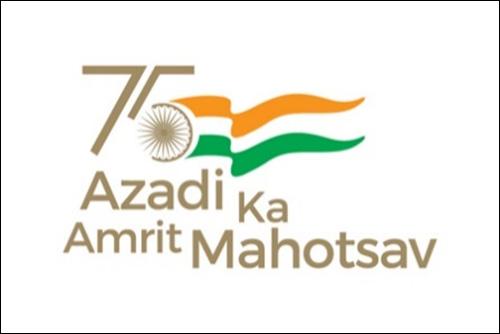
with regional and global challenges, including challenges like undue aggression from other nations, in tandem with their shared democratic ideals. He shared Australia’s evolving democratic and electoral processes since the 1900s to the present, and argued that democracies are not perfect, but are self-correcting and based on consensus-building. He concluded by quoting Indian Prime Minister Narendra Modi’s speech from the 75th UN General Assembly (2021) : “democracy can deliver, [and] democracy has delivered.” Michael Feller started his presentation by remembering the victims of the 26/11 terror attacks in Mumbai in 2008 in which two Australian lives were also lost. He underscored the relevance of PM Modi’s multilateral initiatives, like the International Solar Alliance, in bringing about constitutionality and democratisation to the Indo-Pacific infrastructure and expressed Australia’s appreciation of it. He highlighted the importance of India-Australia cooperation towards regional and international democratic institutions and regimes, such as the ASEAN and the UN Convention on the Law of the Sea. He mentioned that Australia has supported India in the UN Human Rights Council, the Universal Postal Union, and the International Maritime Organization as a good friend. He concluded by appreciating the presence and role of Indian diaspora in Australia in strengthening bilateral relations. Yogesh Joshi started by emphasizing that impact of strategic environment on India’s internal functioning and compared its current strategic environment with the Cold War era, and unprecedented challenges it faces from China, which will exacerbate with diminishing US role and presence in the region. He observed that India-Australia partnership has become stronger because the two countries strive to create a balanced world and a transparent and rules-based regional order driven by their common democratic ethos. Noting China’s Grey Zone tactics on India’s borders and its economic sanctions against Australia in response to the latter’s demand for an investigation into the origins of the COVID-19 pandemic, Yogesh Joshi reminded that the balance of power in the Indo-Pacific is changing drastically. He stressed on the need for India and Australia to build an open and inclusive Indo-Pacific order, work as a counterbalance to China’s actions, and safeguard small island nations’ interests in the region. Shaun Star kickstarted his presentation by sharing with the audience that three Indians have been awarded Australia’s highest civilian honour the Order of Australia: Former Attorney-General of India, Soli Sorabjee, Kiran Majumdar Shaw and Sachin Tendulkar. He observed that the Indian and Australian constitutions have many common tenets borrowed from Great Britain and took note of the shared legal perspectives between India and Australia on aspects like constitutionality and rule of law that are based on the British Common Law. Quoting Michael Kirby, an eminent jurist from Australia, Shaun Star observed that it is intriguing that Indian and Australian lawyers do not know enough about each other and the other country’s legal systems. He listed similarities between the two constitutions such as the separation of powers, independent judiciary and respect for pluralism. He also argued that just like Indian courts have used case-law from Australian jurisprudence as precedents, Australia also has a lot to learn about Bill of Rights (Public Interest Litigation in India) from India and its elaborate constitution. Using examples of diversity in interpretations and approaches across the Indian and Australian judicial systems, Shaun Star argued that despite the shared values of democratic constitutionality and respect for rule of law between the two countries, there still remains a lot for both countries to learn from each other. The last speaker Lalitha Kumaramangalam shared her experience of working with women and marginalised communities across the board observing that constitutional democracies would matter even more in the post-COVID-19 world order as the pandemic has made the global mass political participation a reality. She shared the arguments made by Shaun Star regarding the flexibility of India’s constitution which has in 72 years passed 105 amendments. Taking into account the example of DakshayaniVelayudhan, a female legislator who voiced the concerns of the oppressed classes (the Dalit community), Lalitha Kumaramangalam argued that the Constituent Assembly which drafted the Constitution brought some unique individuality to it, making it a dynamic document. She emphasised that women’s rights have come a long way, but much work is still needed for further empowerment and gender equality. Highlighting the diverse coexistences of religion, gender and classes in India, she argued that despite the “negative publicity,” Indian women particularly and marginalised communities in the country in general have experienced remarkable changes towards equality and empowerment - which is why the “New India” is a model for constitutional democracies, globally. The webinar concluded with a vote of thanks from Dr Ashutosh Misra.
Keynote Speakers
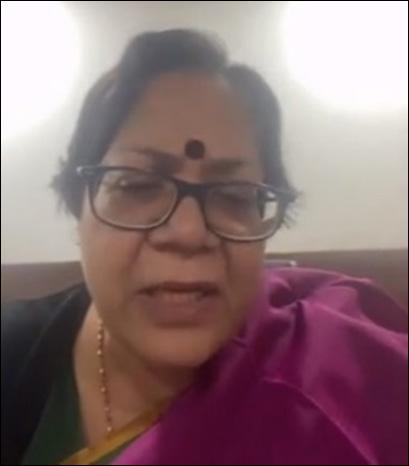
Distinguished Speakers

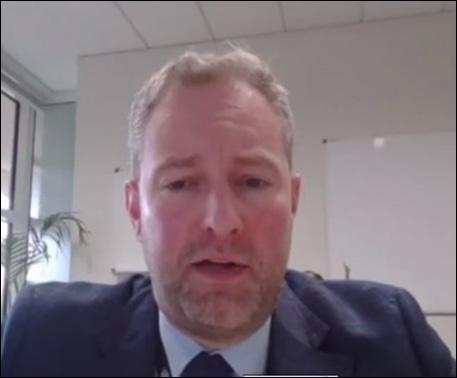

Mr Michael Feller
Prof Yogesh Joshi Ms Lalitha Kumarmangalam
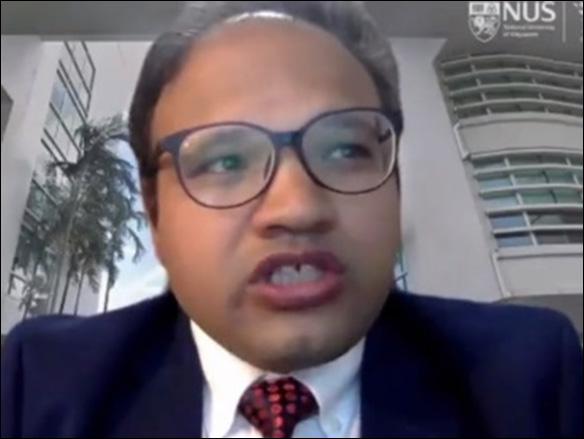
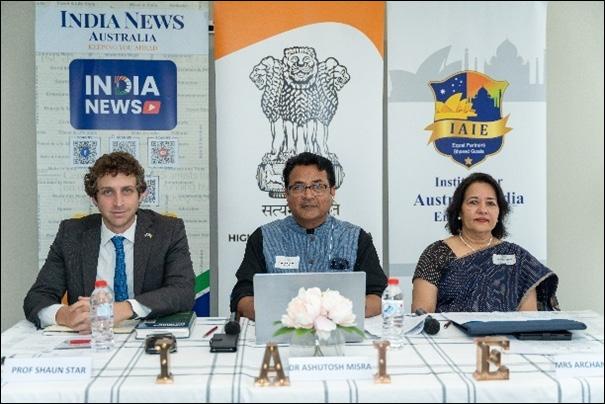
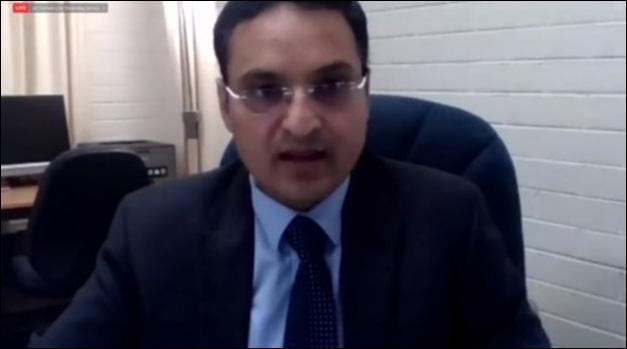
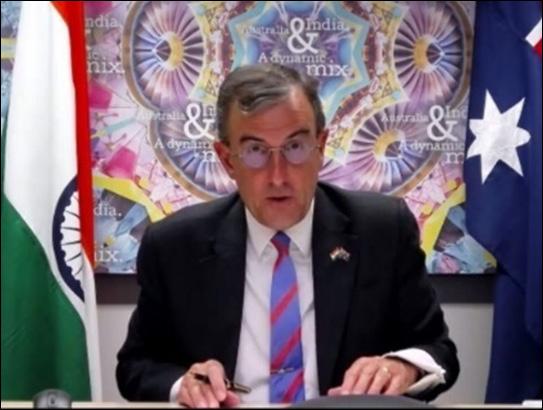
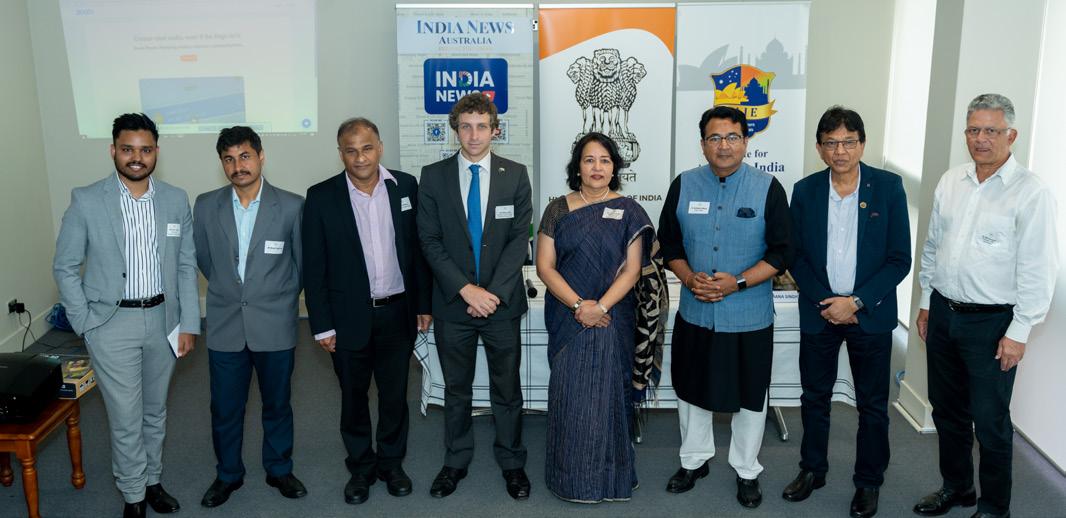
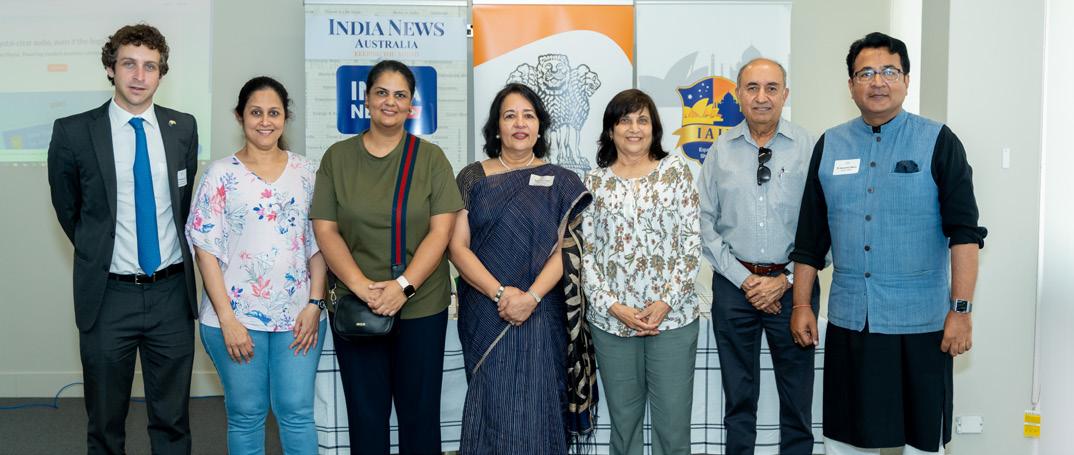
Mr Suneet Mehta Mr Ian Biggs
Prof. Shaun Star, Dr Ashutosh Misra and Mrs Archana Singh
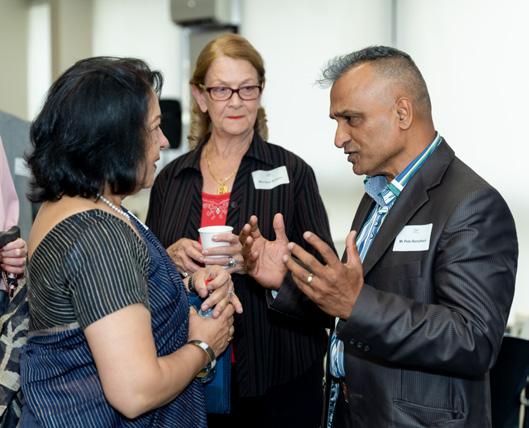
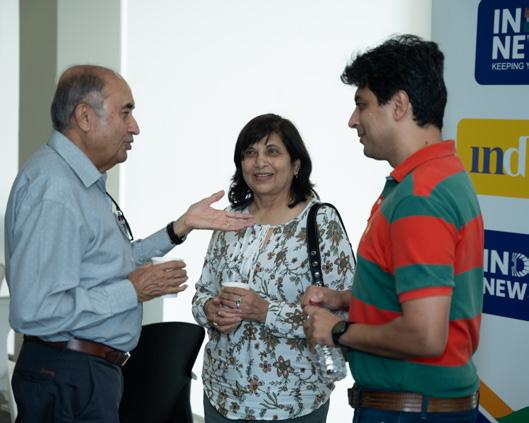
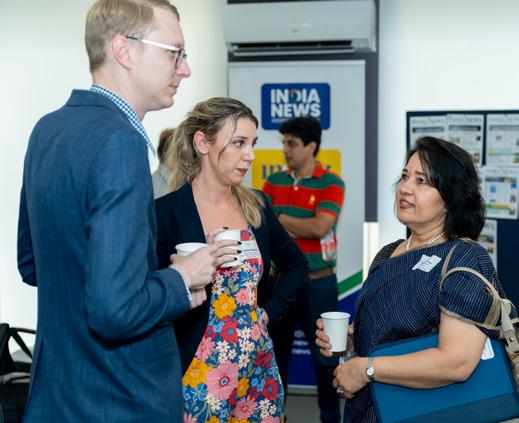
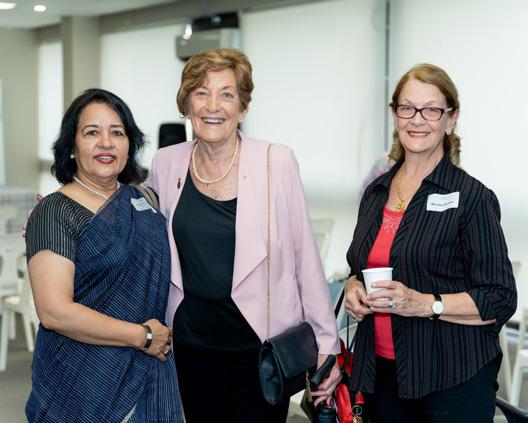
Policy Discussion with Australia India Business Council, “Quad Summit and its Relevance for Australia India Relations”
30 March 2021
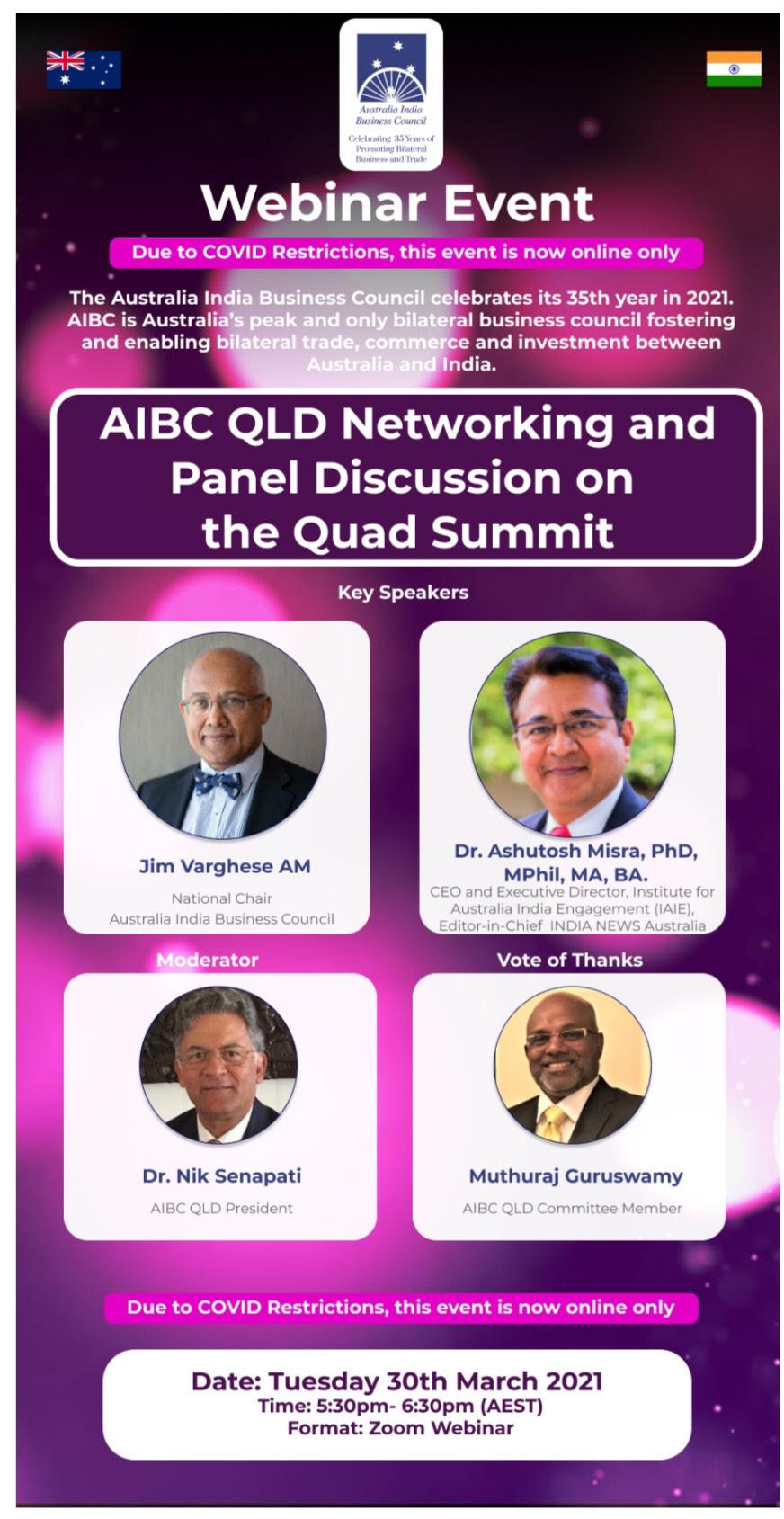
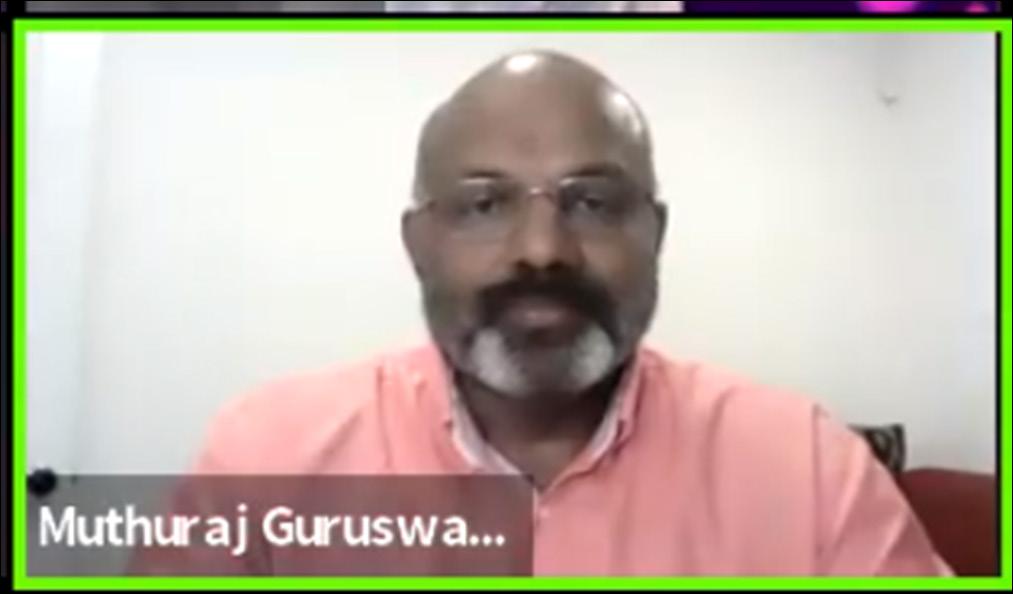
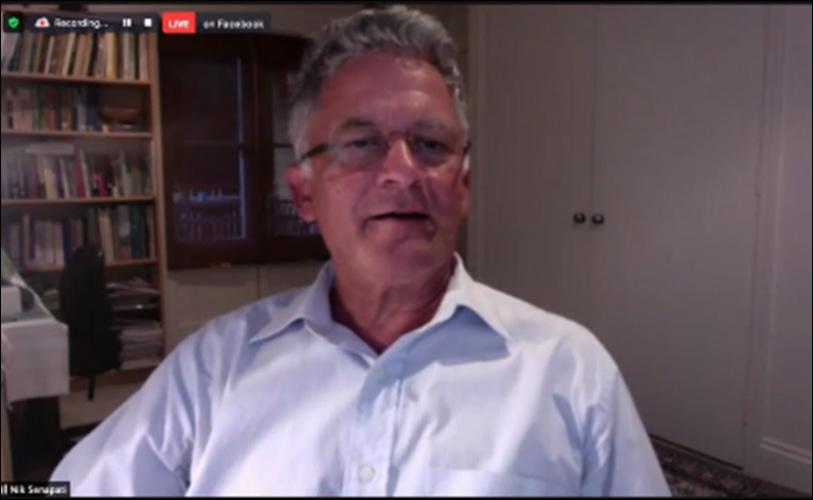
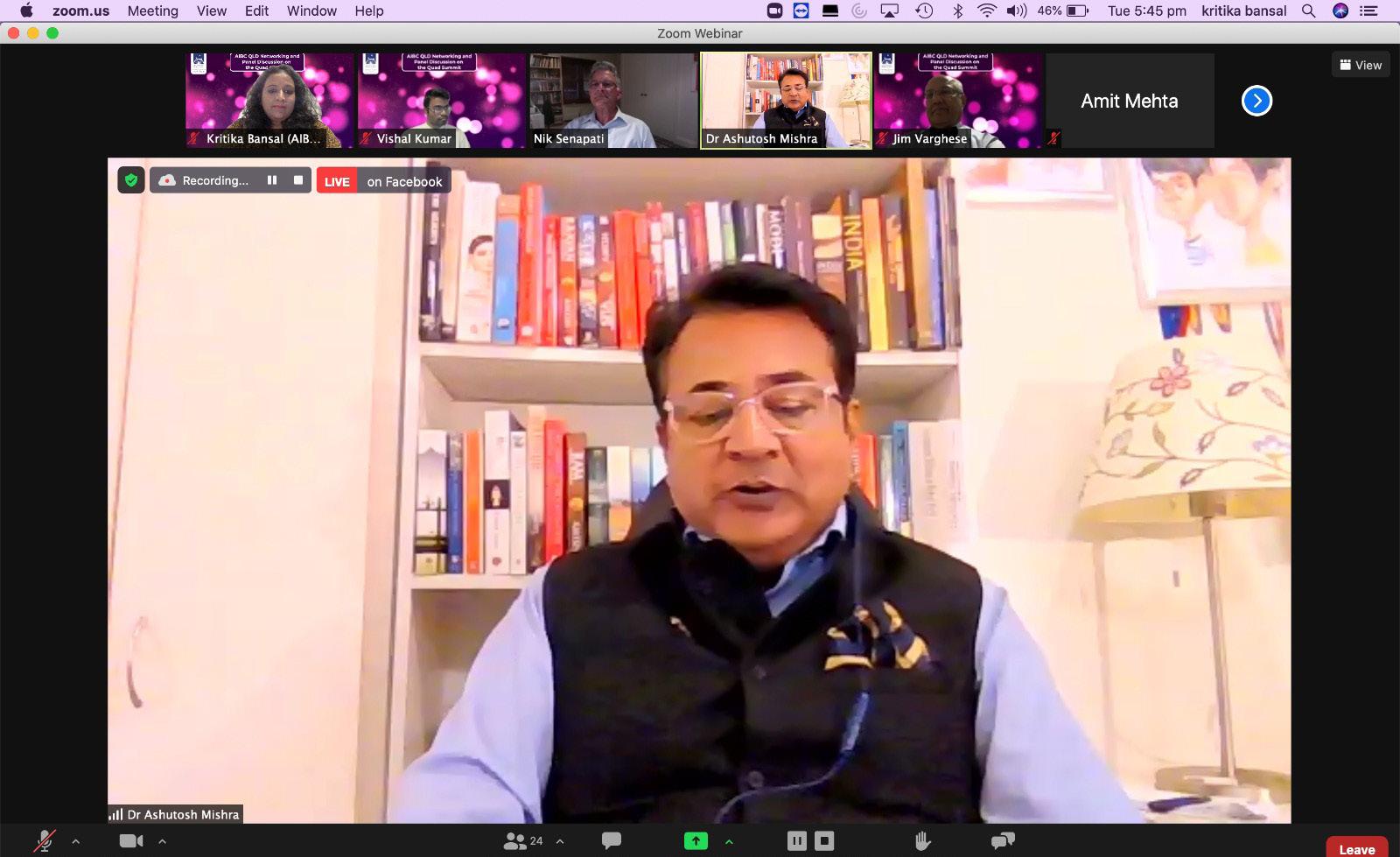
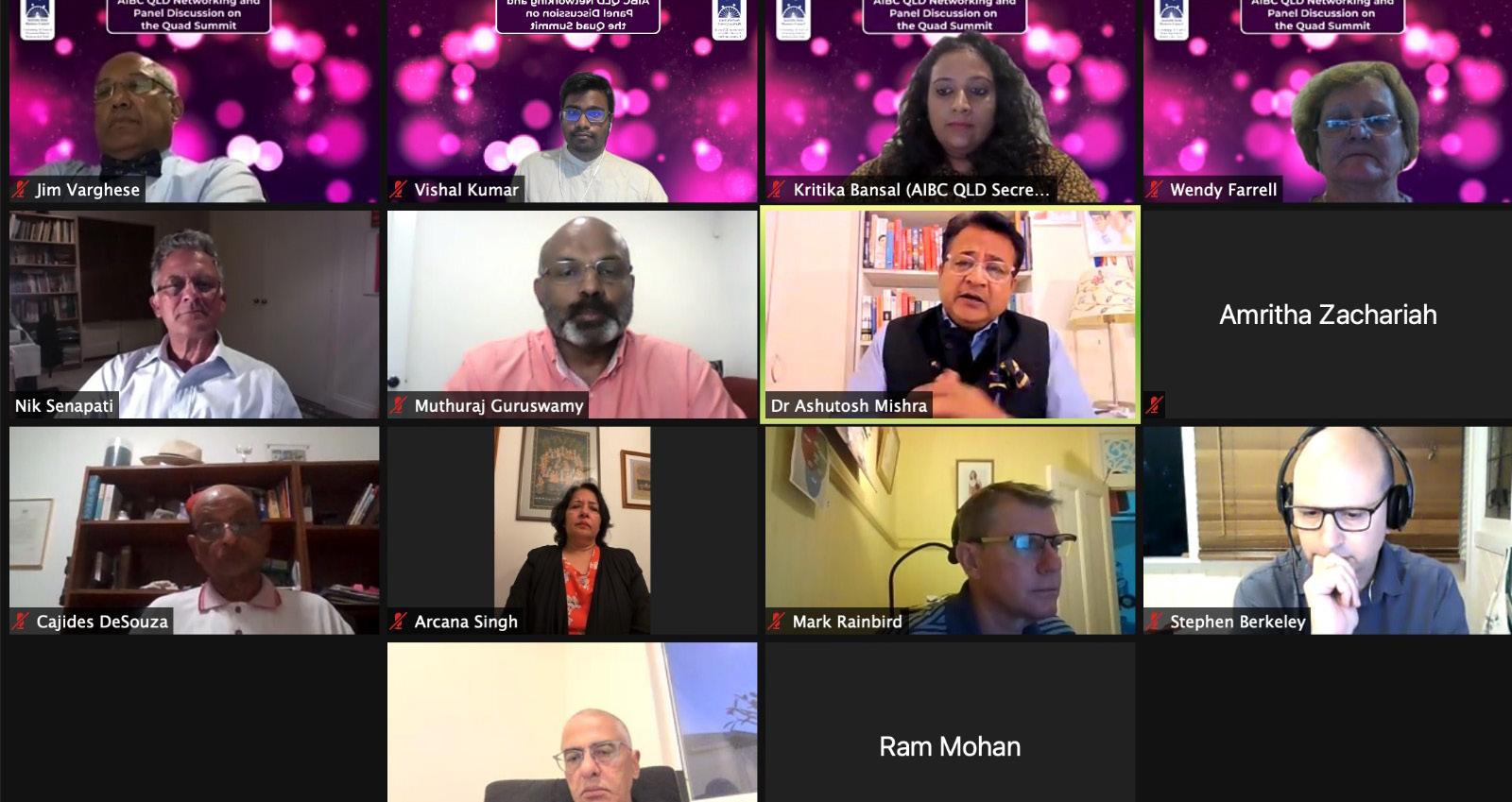
In the wake of the momentous March 12 Quad summit, which saw the leaders of Australia, India, Japan and United States coming together virtually, signalling a milestone in the strengthening bond between the four nations, the Australia India Business Council (AIBC) conducted a webinar on March 30 to debate the potential outcomes of the Quad summit in terms of the business and trade ties between India and Australia. AIBC, which has been fostering bi-lateral trade relations between the two countries ever since its inception in 1986, has in the past also hosted such pivotal discussions to comprehend the profound implications of bi-lateral and multi-lateral meetings featuring India and Australia. Among the panel of key speakers were Jim Varghese AM, National Chair AIBC; Dr. Ashutosh Misra, CEO and Executive Director, Institute for Australia India Engagement, Editor-in-Chief INDIA NEWS Australia; Dr. Nik Senapati, AIBC Queensland President; and Muthuraj Guruswamy, AIBC Queensland Committee Member.
Broadening outlook for stronger partnerships
Introducing the panel of speakers, Dr. Nik Senapati invited Jim Varghese AM to open the discussions, who went on to praise the agility of AIBC in pushing ahead with the agenda of increasing the trade and investment opportunities. Sharing his reflections on the media analysis of the Quad, he stated that the re-emergence of the Quad in recent times is of strategic significance and it is apparent that the Quad is placing an emphasis on practical actions that the four countries in the Quad can take rather than narrowly defining itself as a bulwark against China’s expanding role in the economic, military and strategic presence. With the Quad leaders focusing on a free and open Indo-Pacific region, Varghese stated that the ambition of such engagements is leveraging partnership to help the world’s most dynamic region respond to crisis. There is a growing need for closer cooperation specifically between India and Australia in matters such as supply of cheaper goods, countering cyber-attacks and telecommunication deployment. The spirit of the Quad is to have an Indo-Pacific which is free, open, inclusive, healthy, anchored by democratic values and unconstrained by coercion. However, the key challenges are the economic and health impacts of the Covid-19, climate change, cyber space critical technology, counter-terrorism and humanitarian assistance for disaster relief; and to address these issues, working groups are being formed.
Tracing the Quad’s evolution and India-Australia bilateral history
Dr. Ashutosh Misra delineated the global context leading to the Quad’s fruition and also focused on the bilateral relations between India and Australia. The Quadrilateral comprising US, Japan, Australia and India transpired in 2007, but it was bogged down by certain differences between India and Australia. However, more recently there has been an upswing in bilateral relations in terms of defence, business and trade ties between US and India; India and Japan; and Australia and India. Now, with US President Joe Biden hosting the 12 March inaugural Quad summit, the diplomatic ties among the four nations have reached a new high. It is notable that by keeping a broad agenda of Covid-19 strategy, vaccine production, climate change, supply chain resilience, critical and emerging technologies; and a free, open, secure and prosperous Indo-Pacific, the Quad nations succeeded in downplaying the mutual “Anti-China” concerns and thus avoided disparaging China unnecessarily. Dr. Misra also recapitulated the consistent progression of India and Australia relations which had begun to come into the limelight with the materializing of a strategic partnership in 2009 which was further elevated to a comprehensive strategic partnership with the signing of nine Memorandums of Understanding in the historic June 4, 2020 virtual summit amid the onslaught of the Covid-19 pandemic. Despite noticeable rise in volume of trade which made India Australia’s eighth largest trade partner which is still way below the potential. With the reports of both Peter Varghese and Ambassador Wadhwa recommending more profound involvement of India and Australia as trade partners, Dr. Misra hailed the two reports as the “Magna Carta” of bilateral trade and business ties. He also stated that although the initial context which played a crucial role in bringing India and Australia together were the two nations’ subjective acrimonies with China, both the countries have since then realized the broader advantages of closer ties. Highlighting the likely opportunities for Australia and India, he remarked that as both nations are keen to expand business and trade relations in sync with new geopolitical realities, they are well-positioned for a leadership role. Moreover, both nations have immense opportunities in a wide array of fields including education, agriculture, energy, resources, tourism and healthcare to name a few. He also emphasized that the role of AIBC, Indian diaspora and the larger community is vital to fortify the ties between the two countries. This was followed by a Q&A session in which one of the participants queried about the role AIBC and other concerned groups can play in easing capital mobility and investment from Australia to India. Dr. Misra replied by saying that India’s economic strategy has changed substantially to facilitate greater foreign investment and Australia can thus look forward to more propitious business opportunities in India in the near future. He also said that AIBC and other organisations committed to promoting bilateral ties between the two nations must take concrete steps to enlighten the Australian businesses about the nature of the Indian market and other dynamics at play.
Mr Muthuraj Guruswamy concluded the webinar by thanking all the keynote speakers and attendees for their insights and perspectives. India-Australia Webinar Series on Representation of Women in Directorship and Leadership Roles
A team led by IAIE Board member Associate Professor Shaun Star and Assistant Professor Divyangana Dhankar at O.P. Jindal Global in India and recipients of the prestigious Australian Alumni Grant Sch¬eme 2021 have been working on a project entitled, “Promoting Women in Leadership: Diversity on Boards in Australia and India” to enhance gender representation within corporate and sports boards. Asst. Prof. Divyangana is one of the first female lawyers and the first female dual qualified lawyer (qualified in India and Australia) to receive this grant. Through a multiprong and multi-stakeholder approach, the project aims to increase awareness on challenges and opportunities within corporate governance witnessed by female directors and leaders in India and Australia. This aim is sought to be achieved through interactive and research tools for greater effectiveness and reach. On the interactive side, the project envisages webinars and conferences. On the research side, the project undertakes qualitative and quantitative study for identifying strategies and proposing best practices for improving gender representation on corporate boards with a specific focus on sports and infrastructure sectors.
The project is jointly supported by the Government of Australia and the Centre for India Australia Studies under the Australian Alumni Grant Scheme, 2021. The Centre for India Australia Studies is the first and only centre focusing on bilateral ties between India and Australia embedded in a tertiary Indian educational institution. The partner organisations for the project are Australia India Business Council (AIBC), University of Queensland and Institute for Australia India Engagement (IAIE). Vahura: Onboards is the knowledge partner for the first two webinars outlined below.
27 September 2021 The project was inaugurated by Her Excellency, Hon. Margaret Beazley, Governor of New South Wales during the first webinar on ‘Perspectives of Women on Boards in India and Australia’. Statistical studies, primarily, from companies on stock exchanges in various jurisdictions demonstrate an increase in the number of women directors on corporate boards. Numeric evidence suggests that women have made steady progress in their participation within corporate governance. However, whether numeric evidence aligns with lived experiences of women directors is the question. Four non-executive women directors from India and Australia came together on a single platform to share their professional journey and perspectives on women receiving directorial roles. They brought to light common drivers and challenges for women directors in both countries such as lack of encouragement or sponsorship for such positions; barriers due to choices at child rearing age like maternity leave that impact continuity in professional experience and overcoming perceptions of senior roles being associated with males to inspire confidence in women to network and place their names for leadership positions and directorships. Joining the panel from Australia were Associate Prof. Sarah Kelly OAM, Non-Executive Director at Tourism and Events Queensland and Neema Premji, Federal Director at Australia India Council Board. From India, the panel comprised of Shalini Kamath, Independent Director at Abbott India Limited and Borosil Renewables Limited along with Sonu Bhasin, Independent Director at Whirlpool of India Limited and PNB Met Life.
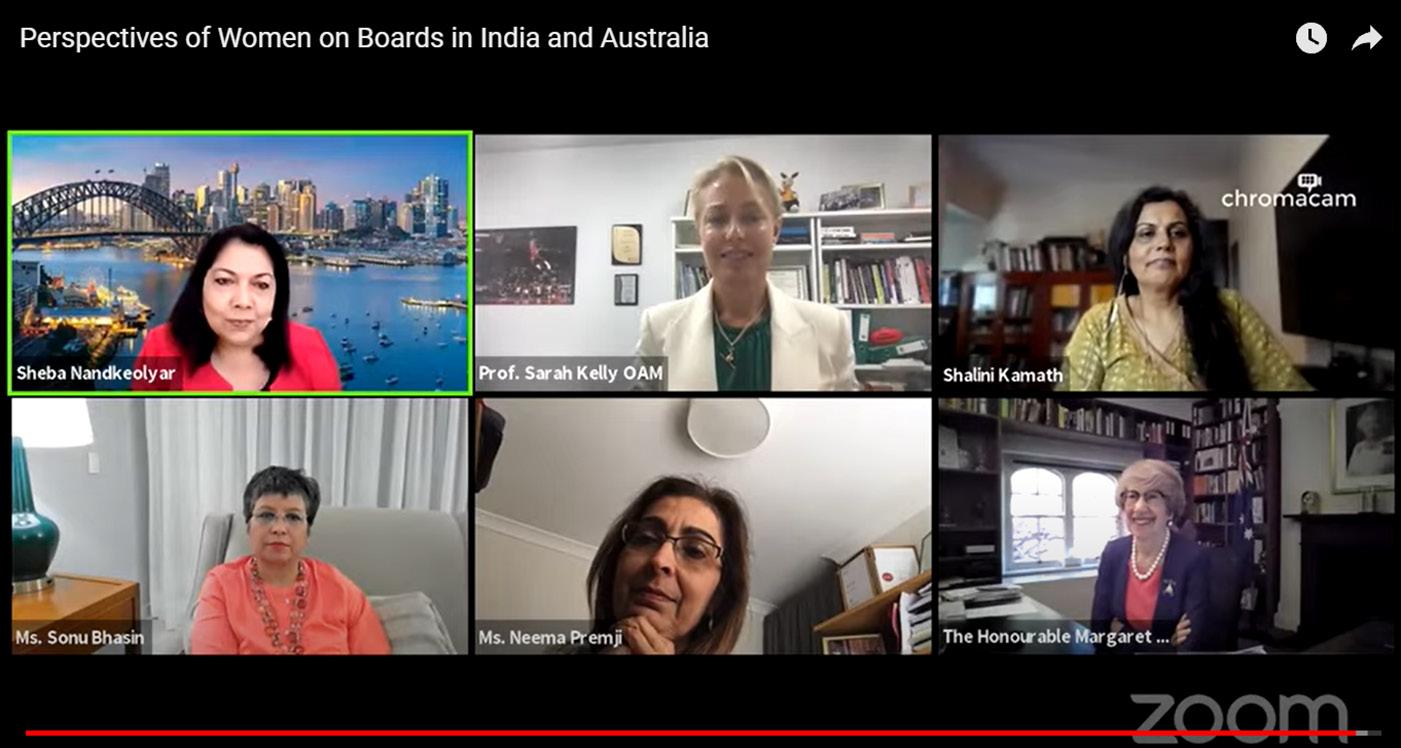
16 November 2021 The second webinar under the project focused on ‘Strategies for Increasing Women in Executive Leadership and Governance Roles’ with Sarah Kirlew, Australian Consul General to South India as the Guest of Honour. It aimed to understand the reasons for witnessing fewer women as executive directors and in key managerial roles from ‘inside’ the company, that is, executive directors than ‘outside’ the company, that is, non-executive and independent directors. Gender diversity, in some respect, is mandated by law and regulation in India, while, it is voluntary in Australia encouraged through good governance principles. This means, companies are aware of their role to increase diversity on their boards but find themselves constrained on placing diversity within the realm of skills and qualifications. Generally, executive roles require experience in operations and a specialist understanding of the company to provide an overview on its day-to-day functioning. However, the skill set is slightly different for non-executive or independent directors who need to carry experience on strategy and overall governance that includes law and finance. As such, many women directors today in both countries occupy non-executive directorships with a background in finance and law. While women directors are on an increase, it isn’t on the operational side. During the webinar, it was noted, that creating a pipeline of women in operational roles is key, not just for the roles themselves but also to provide an opportunity for women from within the company to progress. The panel comprised of Catherine
Maxwell, FGIA FCG- General Manager (Policy and Advocacy), Governance Institute of Australia and Dr. Terry Fitzsimmons- Senior Lecturer (Leadership), University of Queensland Business School from Australia. Joining the discussion from India were Sree Patel - Executive Director, Mondelēz International (India) (formerly, Cadbury India Limited) Kalpana Unadkat – Partner, Khaitan & Co LL.P. (Corporate Governance, Mumbai Office).
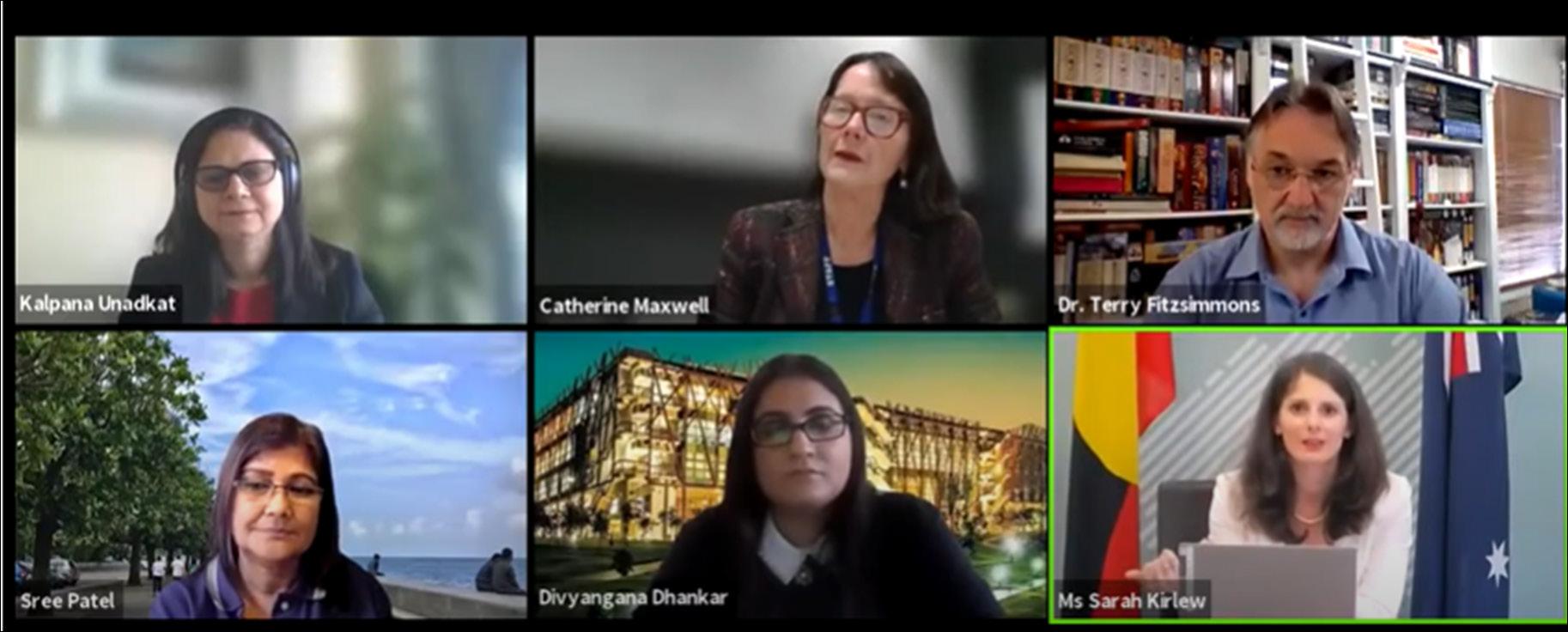
Triveni Dialogue Series
‘Australia and India Economic Strategies: Next Steps’, 1 February 2021
The Institute for Australia India Engagement, the Centre for India Australia Studies (CIAS) at O P Jindal Global University, India and Australia India Business Council (AIBC) hosted the inaugural Triveni Dialogue on 1 February 2021. The dialogue
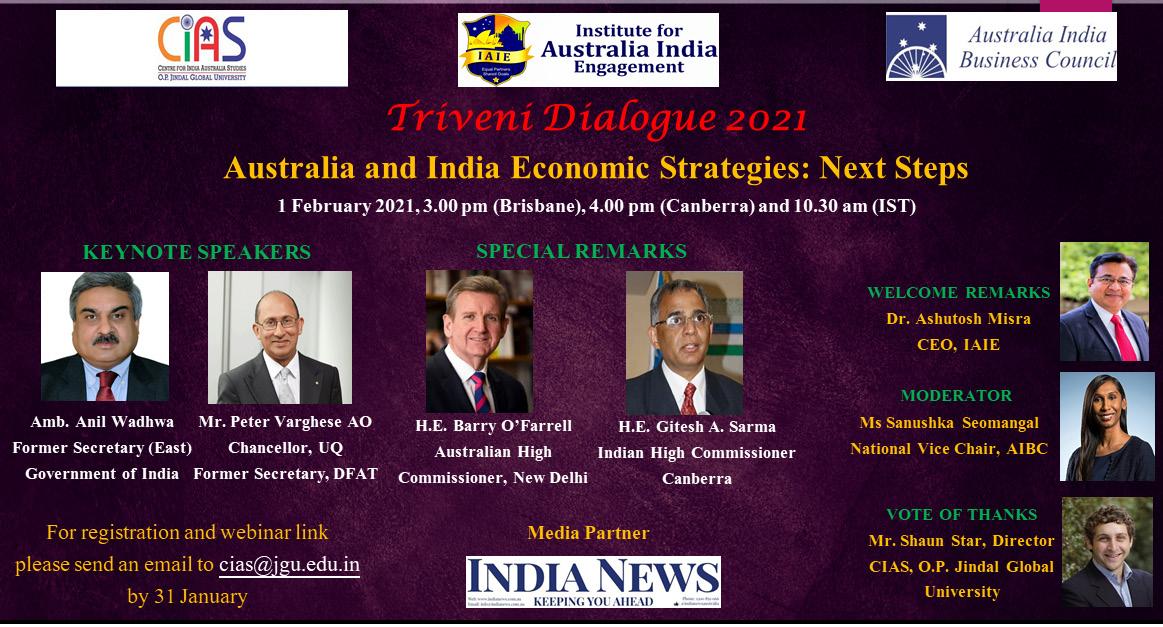
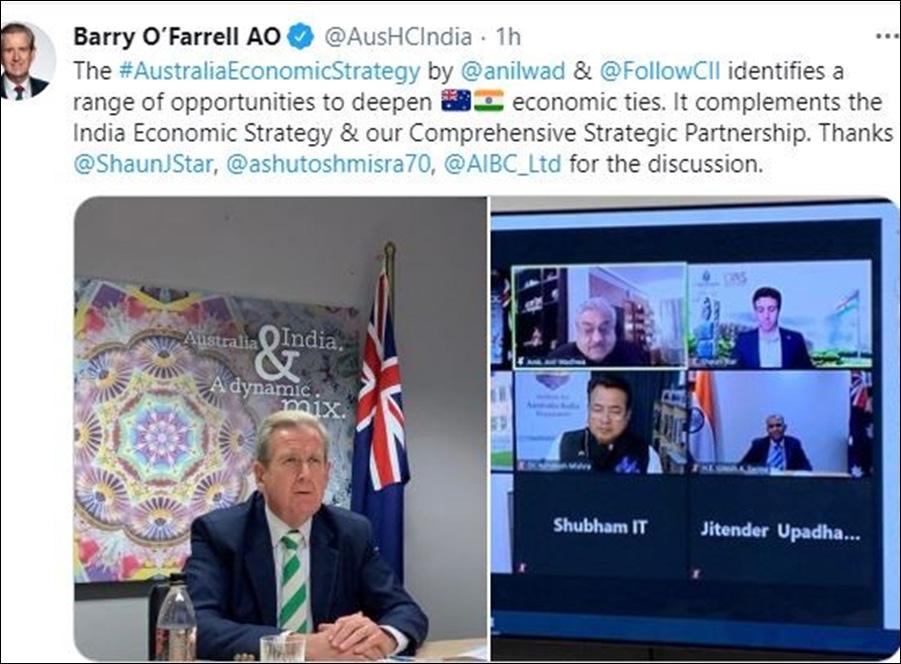
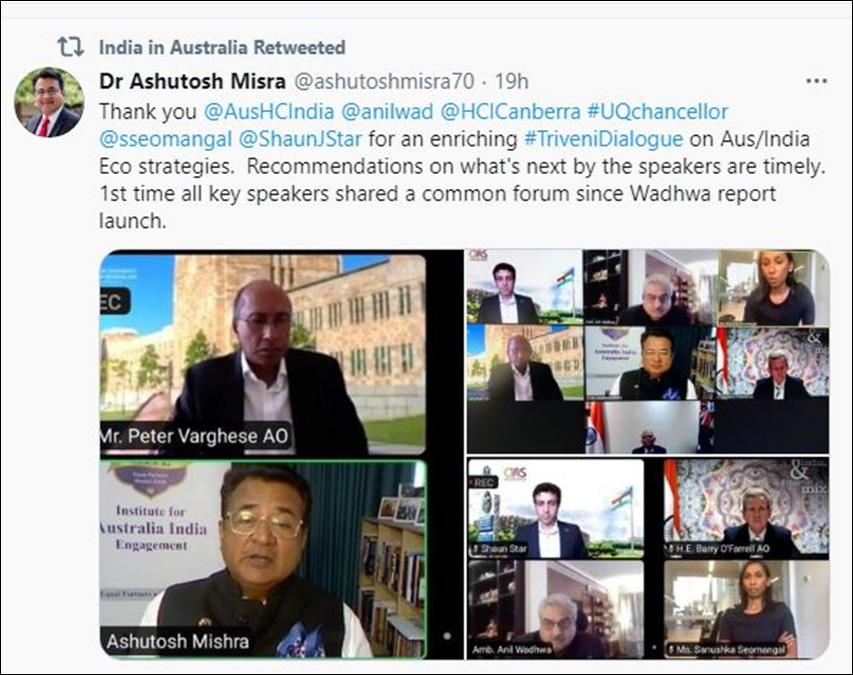
hosted a high-powered panel including H.E. Barry O’Farrell, the Australia High Commissioner to India; H.E. Gitesh A. Sarma, the Indian High Commissioner to Australia; former diplomat Ambassador Anil Wadhwa, Secretary East, Government of India and the Author of Australia Economic Strategy 2020; and Mr. Peter Varghese, AO, Chancellor of the University of Queensland, former Secretary, Department of Foreign Affairs and Trade, Australia Government and the author of the India Economic Strategy to 2035. The discussion was led by Dr Ashutosh Misra who noted the vast array of opportunities that lay before the two countries and why it is important for the two countries to come together to ensure a peaceful neighbourhood against aggressive policies of China. Ms. SanushkaSeomangal, National Vice Chair, AIBC moderated the discussion sharing her insights and also the key points of keynote speakers’ presentations. Prof. Shaun Star, Director, CIAS delivered the vote of thanks to the event organizers as well as the participants and asserted the significance of the webinar as a timely and illuminating discourse in paving the way for strengthening the economic, political and social ties between India and Australia. The dialogue concluded that the future of India-Australia partnership is bright and they must utilize the current opportunities to promote business and trade and peace in the neighbourhood and the world. Several former and serving diplomats, consul generals, senior officials from DFAT, Trade and Investment Queensland (TIQ),Queensland Treasury, Department of Education, community leaders, students, and scholars from Australia and India attended the event. It was the first time that all four keynote speakerscame together on a common forum to discuss the next steps in the India-Australia Comprehensive Strategic Partnership.
